

The Danger of External Debts - Philipp Bagus. Economists and journalists often point to the danger of external public debts — in contrast to internal debts, which are regarded as less troublesome.
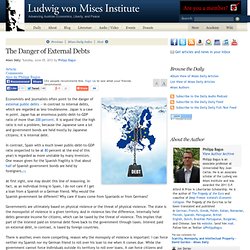
Japan is a case in point. Japan has an enormous public-debt-to-GDP ratio of more than 200 percent. It is argued that the high ratio is not a problem, because the Japanese save a lot and government bonds are held mostly by Japanese citizens; it is internal debt. In contrast, Spain with a much lower public-debt-to-GDP ratio (expected to be at 80 percent at the end of this year) is regarded as more unstable by many investors.
One reason given for the Spanish fragility is that about half of Spanish government bonds are held by foreigners.[1] At first sight, one may doubt this line of reasoning. Governments are ultimately based on physical violence or the threat of physical violence. Banks and governments live in a relationship akin to a symbiosis. External public debts also pose a danger for the US government. Notes. Why Our Current National Debt is not the Largest in History. Community Reinvestment Act. The Community Reinvestment Act (CRA, P.L. 95-128, 91 Stat. 1147, title VIII of the Housing and Community Development Act of 1977, 12 U.S.C. § 2901 et seq.) is a United States federal law designed to encourage commercial banks and savings associations to help meet the needs of borrowers in all segments of their communities, including low- and moderate-income neighborhoods.[1][2][3] Congress passed the Act in 1977 to reduce discriminatory credit practices against low-income neighborhoods, a practice known as redlining.[4][5] Enforcement[edit] The law, however, emphasizes that an institution's CRA activities should be undertaken in a safe and sound manner, and does not require institutions to make high-risk loans that may bring losses to the institution.[3][4] An institution's CRA compliance record is taken into account by the banking regulatory agencies when the institution seeks to expand through merger, acquisition or branching.
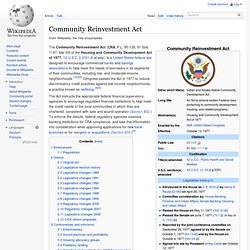
Regulations[edit] History[edit] Original act[edit] Www.discoverthenetworks.org/Articles/theclowardpivenstrategypoe.html. The Cloward-Piven StrategyBy Richard PoeDiscoverTheNetworks.org2005 First proposed in 1966 and named after Columbia University sociologists Richard Andrew Cloward and Frances Fox Piven, the Cloward-Piven Strategy seeks to hasten the fall of capitalism by overloading the government bureaucracy with a flood of impossible demands, thus pushing society into crisis and economic collapse.
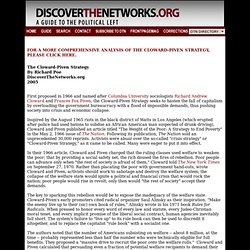
Inspired by the August 1965 riots in the black district of Watts in Los Angeles (which erupted after police had used batons to subdue an African American man suspected of drunk driving), Cloward and Piven published an article titled "The Weight of the Poor: A Strategy to End Poverty" in the May 2, 1966 issue of The Nation. Following its publication, The Nation sold an unprecedented 30,000 reprints. Activists were abuzz over the so-called "crisis strategy" or "Cloward-Piven Strategy," as it came to be called. Many were eager to put it into effect. The Cloward-Piven strategy depended on surprise. Gramm–Leach–Bliley Act. A year before the law was passed, Citicorp, a commercial bank holding company, merged with the insurance company Travelers Group in 1998 to form the conglomerate Citigroup, a corporation combining banking, securities and insurance services under a house of brands that included Citibank, Smith Barney, Primerica, and Travelers.
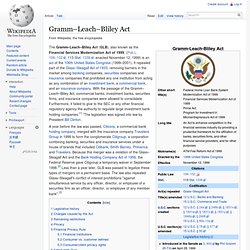
Because this merger was a violation of the Glass–Steagall Act and the Bank Holding Company Act of 1956, the Federal Reserve gave Citigroup a temporary waiver in September 1998.[2] Less than a year later, GLB was passed to legalize these types of mergers on a permanent basis. The law also repealed Glass–Steagall's conflict of interest prohibitions "against simultaneous service by any officer, director, or employee of a securities firm as an officer, director, or employee of any member bank".[3] Legislative history[edit] Final Congressional vote by chamber and party, November 4, 1999. Art & History Home > Historical Minutes > 1941-1963 > A Declaration of Conscience. Rand Paul Takes on the TSA. Rand Paul has introduced legislation to rein in the TSA.
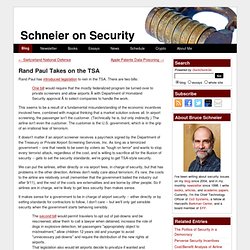
There are two bills: One bill would require that the mostly federalized program be turned over to private screeners and allow airports  with Department of Homeland Security approval  to select companies to handle the work. This seems to be a result of a fundamental misunderstanding of the economic incentives involved here, combined with magical thinking that a market solution solves all.
In airport screening, the passenger isn't the customer. (Technically he is, but only indirectly.) It doesn't matter if an airport screener receives a paycheck signed by the Department of the Treasury or Private Airport Screening Services, Inc. We can put the airlines, either directly or via airport fees, in charge of security, but that has problems in the other direction. This is a mixed bag.
And dogs: a great idea, but a logistical nightmare.